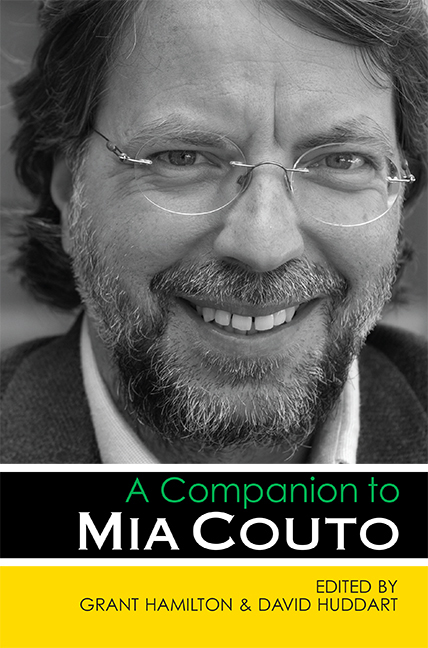Book contents
- Frontmatter
- Dedication
- Contents
- Acknowledgements
- Notes on Contributors
- Introduction
- An Interview with Mia Couto
- 1 Mia Couto in Context
- 2 Uma coisa fraterna Mia Couto & the Mutumbela Gogo Theater Group
- 3 Reading Raiz de orvalho Counterpointing Literary Genres in the Work of Mia Couto
- 4 Spaces of Magic Mia Couto’s Relational Practices
- 5 Mia Couto or the Art of Storytelling
- 6 The Multiple Worlds of Mia Couto
- 7 ‘Ask Life’ Animism & the Metaphysical Detective
- 8 Mia Couto & Translation
- 9 Jesusalém Empty Fathers & Women’s Texts
- 10 Trauma Repetition & Pure Repetition in The Tuner of Silences
- 11 Seeing Like a Crocodile Bird Mia Couto’s The Last Flight of the Flamingo
- 12 Mia Couto & Nostalgia Reading The Last Flight of the Flamingo
- 13 Mia Couto, Contexts & Issues A Bibliographic Essay
- Bibliography
- Index
3 - Reading Raiz de orvalho Counterpointing Literary Genres in the Work of Mia Couto
Published online by Cambridge University Press: 22 May 2021
- Frontmatter
- Dedication
- Contents
- Acknowledgements
- Notes on Contributors
- Introduction
- An Interview with Mia Couto
- 1 Mia Couto in Context
- 2 Uma coisa fraterna Mia Couto & the Mutumbela Gogo Theater Group
- 3 Reading Raiz de orvalho Counterpointing Literary Genres in the Work of Mia Couto
- 4 Spaces of Magic Mia Couto’s Relational Practices
- 5 Mia Couto or the Art of Storytelling
- 6 The Multiple Worlds of Mia Couto
- 7 ‘Ask Life’ Animism & the Metaphysical Detective
- 8 Mia Couto & Translation
- 9 Jesusalém Empty Fathers & Women’s Texts
- 10 Trauma Repetition & Pure Repetition in The Tuner of Silences
- 11 Seeing Like a Crocodile Bird Mia Couto’s The Last Flight of the Flamingo
- 12 Mia Couto & Nostalgia Reading The Last Flight of the Flamingo
- 13 Mia Couto, Contexts & Issues A Bibliographic Essay
- Bibliography
- Index
Summary
There are those who are dazzled by his use of language […] And they even say that he invented a language to speak to himself. Those more grammatically inclined call him ugly names such as logothete, subvertor, untidier of rules […] It seems to me that, like the fortune-teller before the fortune-telling basket, Mia Couto organizes the words of childhood and pays the price of having gone through a poetic phase […] He moved onto prose but got stuck in the web of his first experiences of lifting the skirts of language and trying on its skin. – Ana Paula Tavares, ‘A morphologia das palavres’
In terms of literary genres, to speak of Mia Couto is to establish an almost exclusive correspondence between his work and short stories, novellas and novels, thereby neglecting and effectively marginalizing the poetry that constitutes the beginning of his career. I am referring to Raiz de orvalho e outros poemas (Root of Dew and Other Poems), a collection of poems first published in Maputo in 1983, but which would come to be published in Portugal only in 1999, after the undeniable affirmation of Couto on the European literary stage with his collection of short stories Voices Made Night (1990) and his first novel, Sleepwalking Land (2006). The fate of Raiz de orvalho has been a kind of abandonment; one could almost call it a voluntary forgetting, which Couto himself acknowledges in his hesitation to reissue this ‘book of verse’ (Couto 1999, 7).
Raiz de orvalho is a book towards which I feel a certain distance. Sometimes when I read it, I read it with a mixture of tenderness for knowing that this is something I’ve done, but on the other hand also with a certain critical distancing, for knowing that today I would never write in that way about the same things. (Laban 1998, 1001; my emphasis)
The same reticence can be perceived in the ‘Initial Words’ that introduce the reissued collection. Couto states,
I hesitated for a long long time before I accepted the republishing of this book of verse. The original edition was published in Maputo in 1983.
- Type
- Chapter
- Information
- A Companion to Mia Couto , pp. 49 - 63Publisher: Boydell & BrewerPrint publication year: 2016

